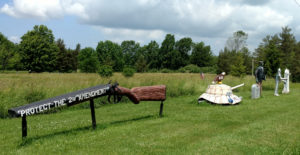Gun control and the SAFE Act – Part One: Closing the private sales loophole
by Len Geller –
Passed in the wake of the Sandy Hook Elementary School massacre in which twenty school children and six adults were murdered by a lone gunman, the New York “Secure Ammunition and Firearms Enforcement Act ” (aka SAFE Act) of 2013 was designed to increase public safety by amending various provisions of New York state law governing handguns, long guns, assault weapons, and ammunition. No sooner had the ink dried on the bill than it was challenged in court as unconstitutional by gun rights advocates because it was rushed through the legislature on a “message of necessity” fast track without the usual three-day waiting period and any feedback from citizens. Even though the lack of legislative discussion and citizen feedback angered many opponents, the New York State Supreme Court denied the challenge on the grounds that “message of necessity” procedures are allowed under the State Constitution and have been used hundreds of times in the past.

Although the SAFE Act passed constitutional muster right out of the starting gate, protests erupted immediately throughout the state, but especially in upstate New York. Responding to local pressure, 52 of the 62 counties in New York passed resolutions expressing their opposition within five months of the law’s enactment, and another 259 towns and villages did the same. Of the 10 counties not passing such resolutions, 8 were downstate, including the 5 boroughs of New York City, and only two were upstate (Albany and Tompkins Counties). In view of such widespread opposition, one would have thought that the SAFE Act was extremely unpopular with voters, but in fact the opposite was the case. In a Siena College poll conducted in February 2013, a full 65% of voters statewide supported the SAFE Act with 30% opposed, and two months later a Quinnipiac University poll found 63% in favor of the law with 33% opposed. Moreover, the Siena College poll found that 50% of upstate voters supported the law while 46% opposed it. A month later a Marist College poll found that 46% of those upstate thought that the law was either good as is or should have gone further, while 48% thought it had gone too far.
Since then, the SAFE Act, despite some well-publicized bumps in the road, has survived constitutional challenge and relentless criticism to emerge as one of the strongest gun control laws in the country. There are at least two major reasons for this. Based on empirical evidence and common sense, most of its major provisions reflect the attitudes and beliefs of a majority of New Yorkers (and Americans). Moreover, New York has a long history of relatively tough gun laws, beginning in 1911 with the historic Sullivan Act that established a licensing requirement for the sale, transfer, and possession of handguns.
But what does the SAFE Act really say and do? How does it strengthen New York’s gun laws? Why has it generated so much controversy and criticism? And where does it stand now, four and a half years after its passage? This article addresses these questions by considering the four major provisions of the law that have had the greatest impact on New Yorkers and sparked the most discussion and debate: (a) background checks for the sale and possession of guns and ammunition; (b) new reporting requirements for mental health professionals concerning dangerous mentally ill patients; (c) an increased ban on assault weapons and magazines for semi-automatic weapons; and (d) the renewal of pistol permits.
Closing the Private Sales Loophole
Of all the provisions of the SAFE Act, the one receiving the most support from New Yorkers, even among gun owners, is the extension of background checks to all purchases and transfers of guns in New York State. Previously, only commercial sales of guns were subject to a background check, leaving a huge private sales loophole (including gun shows) that allowed any person, regardless of his or her criminal or mental history, to purchase almost any type of firearm, including assault weapons, from a private seller. The SAFE Act closes this loophole by requiring that all private sales or transfers be processed through a licensed dealer (or importer or manufacturer) who is obliged to run a federal NICS (National Instant Criminal Background Check System) background check on the buyer, even if the buyer already holds a NY State handgun license. If the buyer fails the background check, the sale or transfer cannot proceed, and the dealer must then run a background check on the seller to determine his or her eligibility to repossess the gun, and if the seller also fails the check, the dealer must then transfer the gun to the police. A background check is not required for the transfer of guns to immediate family members, provided that the purchaser or receiver of the gun is not legally prohibited from possessing it. If he or she is prohibited and the transfer occurs, the transferor is exempt from prosecution if he or she is unaware of the prohibition at the time of the transfer.
For most New Yorkers, it makes perfectly good sense to close the private sales loophole and extend background checks to persons who purchase or receive firearms from non-licensed sellers; however, critics have been quick to point out that this extension does not stop an ineligible individual from obtaining a gun from a family member, black market dealer, or private seller willing to ignore the law. According to critics, a universal statewide background check places an extra burden on law-abiding gun owners and dealers while not preventing actual or would-be criminals from obtaining a gun if they have a resolute desire to do so.
This is a common criticism of gun laws, but supporters of the background check extension argue that it misses the point. Although closing the private sales and gun show loopholes will not prevent all ineligible buyers from obtaining guns illegally, it will make it as difficult as possible, forcing them to go elsewhere to satisfy criminal demand. In New York, the black market in guns is due largely to the influx of guns from southern states with lax gun laws. Over the last two decades, between 80 and 90 percent of crime guns in the state have been traced to states outside of New York. According to gun control supporters, this fact alone speaks volumes about the efficacy of New York’s tough gun laws.
If these laws did not work, they argue, why do most crime guns come from other states with more lax gun laws?
As we have known for a long time, the problem is not New York’s gun laws but the lax gun laws in other states, and this is why gun policy in New York State involves not only the enforcement of strong gun laws but the interdiction of gun traffic from other states.
To the more general criticism that gun laws are ineffective because criminals will ignore them, supporters of gun control reply that gun laws are no less or more enforceable than most other laws. From driving over the speed limit to murder, every law ever written has been violated numerous times. But does that mean that the law should be repealed or considered a failure? Gun laws, like most other laws, will be followed most of the time because most citizens are law-abiding, especially if there are strong sanctions for violating the law. The whole point of extending background checks to private sales is to make it as difficult as possible for criminals and would-be criminals to gain legal access to firearms, some of whom will not be deterred from doing so illegally no matter how difficult the law makes it.
The Ammunition Debacle
One of the “bumps in the road” alluded to earlier concerns the SAFE Act’s provision requiring background checks for all purchases and transfers of ammunition. The aim of this provision is (1) to prevent ineligible gun buyers from purchasing ammunition and (2) to prevent mass shootings like that at Sandy Hook by alerting State Police of high-volume purchasers of ammunition. Towards these ends, the SAFE Act requires that the ammunition buyer appear in person before a licensed ammunition dealer who is then required to notify State Police who conduct a background check. The dealer also has to provide the State Police with information as to the amount, caliber, and manufacturer of the ammunition. If the buyer passes the check, the dealer must then inform the State Police that the transaction has been completed and keep a record of it for up to a year for police inspection.
When it came time to implement the SAFE Act’s ammunition control provision, two years after the SAFE Act’s passage, the State Police had no database to draw from and were unable to create one without a huge cost to taxpayers. The reason for this was simple. Unlike background checks for prospective gun buyers, the NCIS is not authorized under federal law to conduct background checks for ammunition purchases, so the State Police could only rely on a state database to determine eligibility for purchasing ammunition. But since the purchase of ammunition, including online purchases, was not illegal prior to the passage of the SAFE Act (except to those under 16), there was no database to determine such eligibility.
Since implementation of the ammunition background check was impossible, Governor Cuomo signed a Memorandum of Understanding (MOU) with the Republican-controlled State Senate in which both parties agreed not to spend any state monies to create a database of eligibility without bilateral agreement, effectively putting ammunition background checks on indefinite hold. Even though the Cuomo administration has tried to put a positive spin on the MOU agreement, holding out hope for the creation of an ammunition database in the near future, in reality the MOU effectively scuttles this database until control of the State Senate passes into Democratic hands or Republicans have a change of heart with respect to financing it, both of which are highly unlikely.
Len Geller is a free-lance writer and journalist who has a keen interest in New York politics. He lives in Seneca County.
Len Geller’s discussion of Gun control/the SAFE Act continues in our July 28th issue. Up next – Mental health providers and the mentally ill